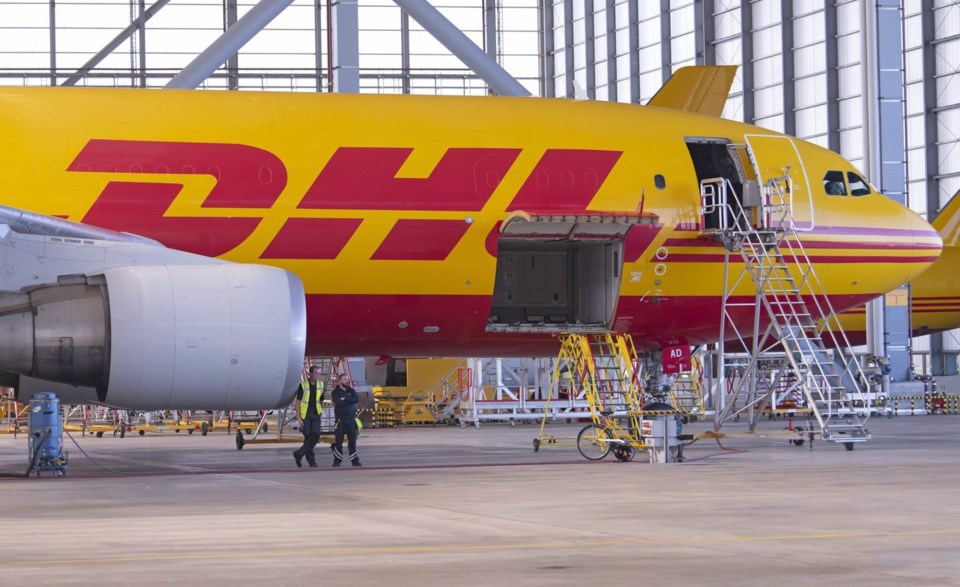DHL Express Canada plans to shut down operations across the country this week amid a strike and lockout involving 2,100 truck drivers and other workers, adding to turmoil in the parcel market.
With the two sides at an impasse, the company said it will halt thousands of daily deliveries starting Friday — the same day that federal legislation banning replacement workers takes full effect.
DHL will stop receiving inbound packages to Canada from abroad on Tuesday at 9 p.m., DHL said in an email.
Spokeswoman Pamela Duque Rai pointed to stalled negotiations with Unifor and the legislation known as Bill C-58, "which prohibits the use of replacement workers during industrial action," she noted.
On June 8, the German-owned carrier said it was rolling out a "contingency plan" that allowed it to keep serving its more than 50,000 customers, which range from retailer Lululemon to e-commerce giants Shein and Temu.
Duque Rai had said in an email at the time that DHL did not expect "significant disruptions" to its service.
Unifor, which represents DHL truck drivers, couriers and warehouse and call centre employees, had warned against any steps to supplant unionized workers with temporary ones, with president Lana Payne saying the move would impose a chill on contract talks.
Last Friday, Unifor's bargaining committee said it had met with DHL Express Canada CEO Geoff Walsh, who stressed the possibility of a halt the following week.
"We will not be intimidated by the company’s threats to disrupt service or shut down operations," the committee said in a June 13 bulletin to members.
The upcoming pause adds to the labour tumult in the parcel sector, as Canada Post remains at loggerheads with 55,000 workers amid strained negotiations and an overtime ban imposed by the union last month.
Canada is not the only country struggling with falling mail volumes — a key factor in the impasse between the two sides — and DHL is among those feeling the pinch.
In March it announced plans to cut 8,000 jobs in Germany this year, marking the largest set of layoffs in its home market in decades.
Back in Canada, Duque Rai sought to frame the union's proposals as unreasonable.
"While we are committed to fair compensation for our employees, our position is that Unifor's demands — a 22 per cent salary increase for hourly employees, as well as a 42 per cent salary increase for owner-operators — do not reflect the current economic landscape and would jeopardize our operational viability," she said.
Payne said DHL has been seeking concessions since negotiations kicked off nearly a year ago.
She highlighted a push by the company to change the pay model for owner-operators — roughly 500 independent contractors drive for DHL and also have union membership — in a way she claimed would reduce their compensation, not boost it.
"What we've seen over many months of bargaining are what I would say is an attempt to divide workers in classifications, pit one group against another, pit one region against another," Payne said in a phone interview on June 8.
A group of employers expressed concerns Tuesday about the effect of legislation passed under the previous Liberal government to ban replacement workers in federally regulated workplaces, pointing to DHL as the latest example of potential disruption.
“Canadians should prepare for more frequent and prolonged work stoppages that can impact supply chains, critical infrastructure and the broader economy," said Daniel Safayeni, CEO of Federally Regulated Employers – Transportation and Communications, in a statement.
The group called for a more "balanced labour relations framework."
In contrast, labour groups have decried federal intervention in labour disputes over the past year, including strikes by railworkers, B.C. dockworkers and WestJet mechanics.
Unifor has said its bargaining priorities with DHL revolve around wages, working conditions and surveillance and automation in the workplace.
This report by The Canadian Press was first published June 17, 2025.
Christopher Reynolds, The Canadian Press



